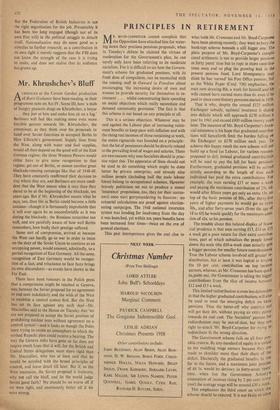Mr. Khrushchev's Bluff
A UDIENCES at the Covent Garden production
A
of Boris Godunov have been reading, in their programme note on Act IV, Scene III, how `a mob of hungry peasants drags on Khrushchev, a boyar . . . they jeer at him and make him sit on a log.' Berliners will feel like making some even more forcible gesture towards Mr. Khrushchev, the commissar, as they think over his proposals to hand over Soviet functions in occupied Berlin to Herr Ulbricht's government. Supply lines from the West, along with water and fuel supplies, would all then depend on the good will of the East German regime; the three Western Powers would either have to give some recognition to that regime, get out of Berlin, or mount another great blockade-running campaign like that of 1948-49. They have constantly reaffirmed their decision to stay where they are, and Berliners are more confi- dent that the West means what it says than they dared to be at the beginning of the blockade, ten years ago. But if Mr. Khrushchev means what he says, too, then life in-Berlin could become a little anxious—though it is fortunately improbable that it will ever again be as uncomfortable as it was during the blockade: the Russians remember too well, and are painfully aware of how well Berlin remembers, how badly their prestige suffered.
Some sort of compromise, arrived at because the West can hardly go to war in order to insist on the duty of the Soviet Union to continue as an occupying power, would amount, admittedly, to a partial recognition of East Germany. All the same, recognition of East Germany would be recogni- tion of a fact, and reluctance to face facts brings its own discomforts—as events have shown in the Far East.
There have been rumours in the Polish press that a compromise might be reached at Geneva, too, between the Soviet proposal for an agreement to end tests indefinitely and the wish of the West to establish a control system first. But the West has set its face against any such deal—Mr.
Macmillan said in the House on Tuesday that `we are not prepared to accept the Soviet position of prohibiting nuclear tests without agreement on a control system'—and it looks as though the Poles were trying to create an atmosphere in which the revised Rapacki plan could receive a hearing. The way the Geneva talks have gone so far does not inspire much hope that it will, for the British and United States delegations seem more rigid than Mr. Macmillan, who has at least said that he would be satisfied with the broad principles of control, and leave detail till later. But if, as the West maintains, the Soviet proposal is insincere, why not call the bluff, and let the world judge Soviet good faith? We should be no worse off if we were right, and enormously better off if we were wrong.






































 Previous page
Previous page